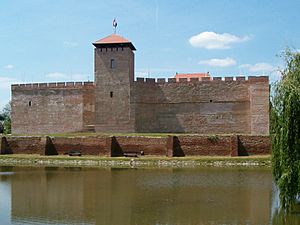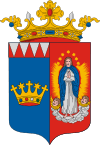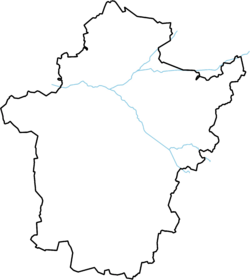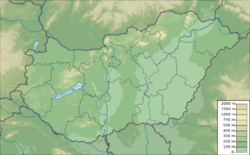Gyula, Hungary facts for kids
Quick facts for kids
Gyula
|
|||
|---|---|---|---|
|
Town
|
|||

Gyula Castle
|
|||
|
|||
| Country | |||
| County | Békés | ||
| District | Gyula | ||
| Area | |||
| • Total | 255.8 km2 (98.8 sq mi) | ||
| Population
(2017)
|
|||
| • Total | 30,004 | ||
| • Density | 117.295/km2 (303.79/sq mi) | ||
| Demonym(s) | gyulai | ||
| Population by ethnicity | |||
| • Hungarians | 83.4% | ||
| • Romanians | 3.1% | ||
| • Germans | 3.1% | ||
| • Gypsies | 0.3% | ||
| • Slovaks | 0.3% | ||
| • Others | 0.8% | ||
| Population by religion | |||
| • Roman Catholic | 18.4% | ||
| • Greek Catholic | 0.4% | ||
| • Calvinists | 17.9% | ||
| • Lutherans | 1.6% | ||
| • Other | 4.5% | ||
| • Non-religious | 28.2% | ||
| • Unknown | 29.0% | ||
| Time zone | UTC+1 (CET) | ||
| • Summer (DST) | UTC+2 (CEST) | ||
| Postal code |
5700, 5711
|
||
| Area code | (+36) 66 | ||
Gyula (pronounced DYOO-lah) is a charming town in Békés County, Hungary. It's famous for its old medieval castle and a relaxing thermal bath. Many important people were born here, including Ferenc Erkel, who composed the Hungarian national anthem, and Albrecht Dürer the Elder, father of the famous artist Albrecht Dürer.
Contents
About the Name Gyula
The town of Gyula gets its name from a powerful Hungarian warlord from the Middle Ages, Gyula III. The word "Gyula" was also a special title used by leaders among the early Hungarian tribes. Today, it's still a common male name in Hungary.
In other languages, Gyula is known as Jula or Giula in Romanian, Jula in German, and Göle in Turkish.
Where is Gyula Located?
Gyula is found in the Great Hungarian Plain, a large flat area in Hungary. It sits on the Fehér-Körös River. The town is about 235 kilometers (146 miles) southeast of Budapest, the capital of Hungary. It's also very close to the border with Romania, only about 5 kilometers (3 miles) away.
Main roads and a railway line connect Gyula to other cities. Highway 44 is a modern, four-lane road that links Gyula to Békéscsaba, the county seat.
A Look at Gyula's History
The first time Gyula was mentioned in writing was in a document from 1313. It talked about a monastery called Gyulamonostora. By 1332, the area around the monastery was already known as Gyula.
The building of Gyula Castle started in the 1300s, but it wasn't fully finished until the mid-1500s. The castle belonged to important families, including John Corvinus, who was the son of King Matthias Corvinus.
The Ottoman Siege of 1566
In July 1566, a large Ottoman army, with about 30,000 soldiers, surrounded Gyula Castle. The town's defenders bravely held out for 63 days. They finally surrendered to protect the people inside the castle. Gyula Castle held out longer than any other castle in Hungary against the Ottoman army during that time.
After the surrender, the Ottoman forces took control of the town. Gyula became part of Ottoman Hungary and was known as Göle.
Liberation and New Beginnings
By the end of 1693, Gyula was one of the last places the Ottomans held north of the Maros River. In 1694, the Ottoman commander in Gyula decided to surrender because they couldn't get food supplies. On December 21, 1694, an agreement was signed for the castle to be handed over. On January 18, 1695, the Ottoman soldiers left. After 129 years, Christian forces freed the city.
Because of the many wars, most of the original Hungarian residents had left Gyula. The area became almost empty. In the early 1700s, a landowner named János Harruckern invited new settlers from Germany, Hungary, and Romania to rebuild the town.
By 1881, Gyula had over 18,000 residents, including Hungarians, Romanians, Germans, and Slovaks. In the 20th century, Gyula became a popular place for tourists. The famous thermal bath opened in 1942 and was made bigger in 1959. The historic castle was also restored in 1962.
People and Cultures in Gyula
In 2011, Gyula had a population of 31,067 people. Most residents are Hungarians. There are also significant communities of Romanians and Germans. In Hungary, people can sometimes say they belong to more than one ethnic group.
Gyula is an important center for the small Romanian community in Hungary. They have their own newspaper called Foaia Românească (which means "The Romanian Sheet"). There's also a school for Romanian students, the Nicolae Bălcescu Romanian Gymnasium, Primary School and College. The Diocese of Gyula, which is the Romanian Orthodox church for Romanians in Hungary, is based here. Gyula has two Romanian Orthodox churches and even a consulate general of Romania.
Many different religions are practiced in Gyula. The main ones include Roman Catholic, Hungarian Reformed (Calvinist), Orthodox, and Lutheran. Some people in Gyula are not religious, and some prefer not to say what their religion is.
Fun Places to Visit in Gyula
Gyula has many interesting places for visitors:
- Gyula Castle (Gyulai vár): The historic castle that played a big role in the town's history.
- Thermal Bath (Gyulai gyógyfürdő): A popular place to relax in warm, healing waters.
- 100-year-old Confectionery (100 éves cukrászda): A very old and famous pastry shop.
- Town Hall (Városháza): Built in 1861, it's an important building in the town center.
- Birth House of Ferenc Erkel (Erkel Ferenc szülőháza): The home where the composer of the Hungarian national anthem was born.
- Saint Michael Cathedral (Szent Miklós katedrális): A beautiful church built in 1825.
- Roman Catholic Church (Római katolikus templom): A church built between 1775 and 1777.
- Roman Catholic Chapel (Római katolikus kápolna): A smaller chapel built between 1738 and 1752.
Sports in Gyula
The Christián László Municipal Sports Complex is a huge sports area in Gyula. It covers 13 hectares (about 32 acres) and has many different facilities. You can find a football pitch with an athletics track, a motorcycle speedway track, two more full-size football pitches, tennis courts, basketball courts, and even a skateboarding area.
Famous People from Gyula
Many notable people have connections to Gyula:
Born in Gyula
- Béla H. Bánáthy (1919–2003): A social scientist and professor.
- Zoltán Bay (1900–1992): A famous physicist (born in Gyulavári, which is now part of Gyula).
- Imre Bródy (1891–1944): A physicist.
- Albrecht Dürer the Elder (1427–1502): The father of the well-known artist Albrecht Dürer.
- Ferenc Erkel (1810–1893): A very important Hungarian composer.
- László Krasznahorkai (born 1954): A respected novelist and screenwriter.
- Mihály Mező (born 1978): A popular singer and musician.
- George Pomutz (1818–1882): A Romanian-American diplomat and general.
Lived in Gyula
- Béla Bartók (1881–1945): A world-famous Hungarian composer.
Buried in Gyula
- John Corvin (1473–1504): King of Bosnia and the son of King Matthias Corvinus.
- Beatrice de Frangepan (1480–1510): The wife of John Corvin.
Gyula's Sister Cities
Gyula has "twin towns" or "sister cities" around the world. These are cities that have special friendly relationships and often exchange visitors or cultural programs. Gyula is twinned with:
Images for kids
See also
 In Spanish: Gyula para niños
In Spanish: Gyula para niños
 | George Robert Carruthers |
 | Patricia Bath |
 | Jan Ernst Matzeliger |
 | Alexander Miles |










